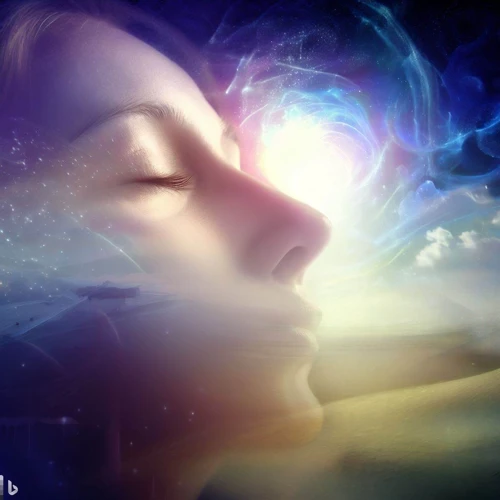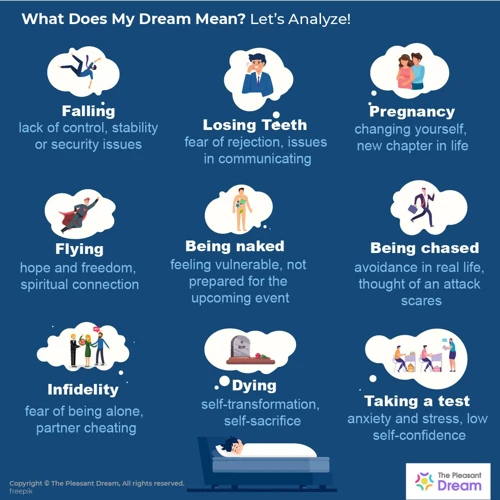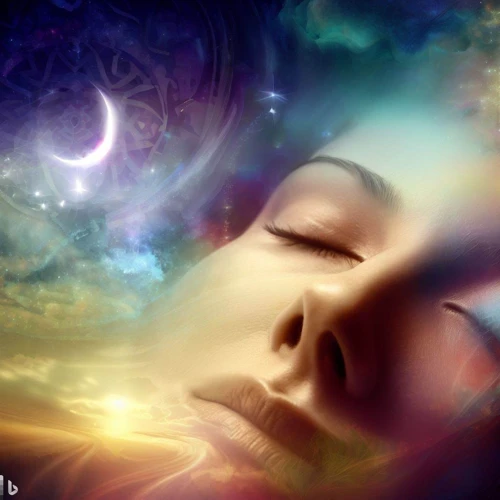Have you ever woken up from a dream, still caught in the vivid imagery, wondering why certain people featured so prominently in your nighttime visions? Dreaming about someone can be a perplexing experience, leaving us questioning the meaning behind these encounters. Whether it’s a familiar face, a stranger, a deceased loved one, or even a celebrity, dreams have a way of bringing these individuals into our subconscious realms. In this article, we will explore the science behind dreams, delve into the various types of dream encounters, discuss methods for interpreting dream meanings, explore spiritual perspectives, and offer tips for analyzing and journaling your dreams. Get ready to unravel the mysteries of why we dream about someone and gain a deeper understanding of the messages and symbolism hidden within our nightly visions.
The Science of Dreams

When we drift off to sleep each night, our minds venture into a realm filled with dreams, a fascinating phenomenon that has puzzled scientists and philosophers alike. The purpose of dreams, still shrouded in mystery, remains a topic of great debate. While some theories suggest that dreams serve to process and consolidate memories, others propose that they play a role in problem-solving and emotional regulation. One thing is certain: dreams offer a unique window into the subconscious mind. As we sleep, our brain creates a rich tapestry of images, emotions, and sensations, formed from a complex interplay of neural activity. But why do we remember some dreams vividly, while others slip away like sand through our fingers? The answer lies in the intricate workings of our memory systems, influenced by factors such as sleep stage, emotional significance, and personal experiences. As we journey deeper into the world of dreams, we begin to unravel the enigma behind why we dream about someone and unlock the secrets hidden within our nocturnal adventures.
1.1 The Purpose of Dreams
The purpose of dreams continues to baffle researchers and experts. Various theories have been proposed to explain their significance, yet no definitive answer has been found. Some suggest that dreams serve as a way for our brains to process and consolidate memories, helping us retain important information. Others believe that dreams may provide a platform for problem-solving and creativity, allowing us to explore different scenarios and perspectives. Additionally, dreams may play a role in emotional regulation, helping us work through unresolved feelings and experiences. While the purpose of dreams remains elusive, their existence and impact on our lives are undeniable.
1.2 The Role of the Subconscious Mind
The subconscious mind plays a crucial role in shaping our dreams, acting as a gateway to our deepest thoughts, desires, and emotions. While we are awake, our conscious mind takes charge, making decisions and guiding our actions. However, when we sleep, the subconscious mind takes the stage, exerting its influence over the content of our dreams. It taps into our fears, aspirations, and unresolved issues, bringing them to the forefront of our consciousness in the form of symbolic imagery and metaphorical narratives. This is why dreams often feel so enigmatic and abstract, as they explore the hidden recesses of our minds. As we dream about someone, it reflects our subconscious’s attempt to process interpersonal relationships, unresolved conflicts, and even unexpressed feelings. By paying attention to these dreams and digging beneath the surface, we can gain valuable insights into our innermost selves.
1.3 Why We Remember Some Dreams and Forget Others
There are several factors that contribute to why we remember some dreams vividly while others fade into oblivion. Firstly, the intensity of emotions experienced during a dream plays a crucial role in memory consolidation. Dreams that evoke strong feelings, such as fear, joy, or excitement, are more likely to be etched into our memory. Secondly, the salience of the dream content itself can affect our ability to recall it. Dreams that contain unusual or significant events, people, or symbols are more likely to be retained in our conscious awareness upon waking up. Additionally, our sleep stage when a dream occurs influences our memory of it. Dreams that take place during REM (rapid eye movement) sleep, a stage associated with increased brain activity and vivid dreams, are usually easier to remember. Lastly, dream journaling can enhance dream recall. By recording dreams upon waking up, we signal to our brain that dreams are significant and worth remembering. These factors combined contribute to why we remember some dreams with vivid clarity, while others slip away like fragments of a forgotten story.
Types of Dream Encounters

As we venture into the realm of dreams, we encounter a diverse cast of characters that can leave us wondering about their significance. Dream encounters come in various forms, each offering a unique glimpse into our subconscious mind. Familiar faces often make frequent appearances, representing people we know in real life, such as family members, friends, or colleagues. Strangers, on the other hand, add an element of intrigue and mystery to our dreams, leaving us questioning their identity and purpose. In some instances, our deceased loved ones may visit us in our dreams, offering comfort or messages from the beyond. And who could forget those dreams where we find ourselves in the company of celebrities or public figures, perhaps reflecting our fascination or admiration for these individuals. These diverse types of dream encounters provide a rich tapestry of experiences that beg us to unravel their deeper meaning and the messages they may hold for our waking lives.
2.1 Familiar Faces
Dreaming about familiar faces can be a common occurrence that leaves us both intrigued and curious. These familiar faces can include family members, friends, colleagues, or even acquaintances. Our dreams may feature familiar faces due to the deep emotional connections we have with these individuals. They may symbolize different aspects of ourselves or represent unresolved issues or memories tied to these people. Dreaming about familiar faces can evoke a range of emotions – from joy and comfort to confusion and even fear. Exploring the context, emotions, and interactions within the dream can provide insight into the meaning and significance behind these dream encounters. Whether it’s a nostalgic reunion or a perplexing encounter, familiar faces in dreams offer a unique opportunity to explore the depths of our subconscious minds.
2.2 Strangers
Dreaming about strangers can be an intriguing experience, leaving us wondering about the significance of these unfamiliar faces in our dreams. These dreams may represent aspects of ourselves that we have not yet discovered or explored, or they could symbolize the potential for new opportunities and experiences in our waking lives. The presence of strangers in our dreams might also reflect our subconscious mind’s ability to create new characters and scenarios, using the people we encounter in our everyday lives as inspiration. Paying attention to the emotions and interactions in these dreams can provide valuable insights and clues about our current state of mind and any hidden desires or fears that may be at play. So, the next time a stranger appears in your dream, take a moment to consider the possible meanings and messages that they may hold for you.
2.3 Deceased Loved Ones
Dreaming about deceased loved ones is a poignant and emotional experience that many of us have encountered. These dreams can provide a sense of comfort and closure, as we feel the presence of our departed loved ones once again. The appearance of a deceased loved one in a dream can be seen as a manifestation of our ongoing connection with them. It may signify that they are still with us in some way, offering guidance, support, or a message from beyond. However, it is important to remember that dreams are highly subjective and can be influenced by our own beliefs, desires, and memories. While some view these dreams as visits from the other side, others interpret them as a reflection of their own longing for connection or unresolved feelings surrounding the person’s passing. Ultimately, the interpretation of these dreams is deeply personal, and each individual must explore their own emotions and experiences to unravel the meaning behind their encounters with deceased loved ones.
2.4 Celebrities or Public Figures
Dreaming about celebrities or public figures is a common occurrence that can leave us feeling intrigued and curious about the significance behind these encounters. In our dreams, these well-known individuals often represent certain qualities or characteristics that we associate with them. Seeing a celebrity in a dream may symbolize our desire for fame, recognition, or success. It could also reflect our admiration for the qualities they possess. Alternatively, dreaming about a public figure may indicate that we are seeking guidance or inspiration from someone influential in our waking life. These dreams can also serve as a reminder of the impact that these individuals have on society and the influence they hold over our thoughts and aspirations. Whether it is a chance encounter or a meaningful interaction, the presence of celebrities or public figures in our dreams can offer a fascinating glimpse into our own desires, aspirations, and the broader cultural landscape we inhabit.
Interpreting Dream Meanings

Dreams have long been regarded as a source of hidden messages and symbolic meanings. When it comes to interpreting dream meanings, there are various approaches to consider. One method involves unraveling the symbols and signs embedded within the dream. These symbols can provide valuable insights into our subconscious desires, fears, and experiences. Paying attention to the emotions we feel during the dream and upon waking can also shed light on the emotional connections that underlie our dreams. Exploring the dynamics and interactions between ourselves and the individuals present in our dreams can reveal deeper insights into our relationships and inner conflicts. By analyzing the components of our dreams through these lenses, we can begin to uncover hidden meanings and gain a better understanding of ourselves and our subconscious mind.
3.1 Symbols and Signs
Symbols and signs in dreams hold a significant role in unraveling their deeper meanings. These symbolic elements can vary greatly and may be unique to each individual’s personal experiences and cultural influences. Common dream symbols include water, animals, vehicles, and houses, among many others. For instance, dreaming about water can symbolize emotions, cleansing, or renewal, while animals may represent specific traits or characteristics. It’s important to consider the context of the dream and the emotions connected to these symbols. It is worth noting that dream interpretation is subjective, and the same symbol can hold different meanings for different individuals. To better understand the symbols and signs in your dreams, keeping a dream journal can be invaluable. By recording recurring symbols and analyzing their potential significance, you can begin to unlock the hidden messages that lie within your dreams.
3.2 Emotional Connections
In the realm of dreams, emotional connections hold a significant role in shaping our experiences. When we dream about someone, the emotional connection we have with them in waking life often seeps into our subconscious narratives. The intensity of our emotions towards a person can influence the nature of our dreams about them. Whether it’s a deep love, unresolved conflicts, or even nostalgia, these emotions can manifest in our dreams, reflecting our innermost feelings and desires. Dreams have a way of amplifying and exaggerating emotions, creating a vivid landscape for us to explore and process our emotional connections with others. It is through these dreams that we may gain insights into our true feelings, bringing us face-to-face with our unexpressed desires or unresolved emotional baggage. Paying attention to the emotional undercurrents in our dreams provides valuable clues to unlock the deeper meaning and significance behind our dream encounters.
3.3 Relationship Dynamics
Relationship dynamics within dreams can provide valuable insights into our subconscious thoughts and emotions. In our nightly visions, we may encounter scenarios that reflect the state of our relationships, whether they are romantic, platonic, or familial. These dreams can depict a range of emotions and interactions, such as conflicts, unresolved issues, or moments of intimacy and connection. Pay attention to the dynamics between yourself and the person you are dreaming about, as it can offer clues about the current state of your relationship in waking life. Consider the emotions felt during the dream, the actions and conversations that take place, and the overall energy between you and the other person. Reflecting on these relationship dynamics can help you gain a deeper understanding of your feelings, desires, and concerns surrounding your connections with others.
Spiritual Perspectives

When exploring the phenomenon of dreaming about someone, it is important to consider spiritual perspectives. Many spiritual traditions and belief systems propose that dreams hold significance beyond the realm of the physical. Some theories suggest that dreams can provide insight into soul connections and past lives, allowing us to connect with individuals from different times or dimensions. Additionally, dreams are seen as a means of receiving messages from the universe. Symbolic imagery, signs, and metaphors encountered in dreams may carry hidden guidance or warnings. From a spiritual standpoint, dreams serve as a tool for spiritual growth and guidance, offering us opportunities for self-reflection, healing, and transformation. By paying close attention to our dreams and the individuals who appear in them, we can gain a deeper understanding of ourselves and our spiritual journeys, unraveling the intricate connection between the conscious and the metaphysical realms.
4.1 Soul Connections and Past Lives
Soul connections and past lives have long been subjects of fascination and speculation when it comes to dreaming about someone. Some spiritual beliefs posit that our dreams can serve as glimpses into past lives or connections with souls we have encountered in previous existences. These dreams may evoke strong emotions or a sense of familiarity, as if we have known the person from another time or place. While this perspective is not universally accepted, it adds another layer of intrigue and mystery to the phenomenon of dreaming about someone. Exploring the possibility of soul connections and past lives can bring a deeper understanding of the profound and interconnected nature of our dreams.
4.2 Messages from the Universe
Dreams have long been believed to hold a deeper meaning, with some interpreting them as messages from the universe or higher powers. According to this perspective, dreams serve as a way for the universe or higher realms to communicate with us, offering guidance, insights, and even warnings. These messages can come in the form of symbols, metaphors, or even direct communication with spiritual beings. It is believed that by paying attention to and analyzing these dream messages, we can tap into a greater understanding of ourselves and our path in life. Whether these messages are seen as coming from our own intuition, our subconscious mind, or a divine source, they hold a profound significance that can bring about transformation and growth. By exploring the themes, symbols, and emotions in our dreams, we can uncover the hidden messages the universe may be conveying, leading us towards a deeper connection with our higher selves and the world around us.
4.3 Spiritual Growth and Guidance
– Some people believe that dreaming about someone can be a sign of spiritual growth and guidance. These dreams are seen as messages from the universe or a higher power, offering insights and lessons for personal development.
– The presence of certain individuals in our dreams may signify their role as spiritual guides or mentors, providing us with support and direction on our spiritual journey.
– These dreams can offer profound revelations, nudging us towards self-reflection, introspection, and a deeper understanding of our purpose in life.
– While interpreting these dreams can be subjective, paying attention to the emotions, symbols, and messages within them can provide valuable insights and guide us towards a path of spiritual enlightenment.
– Keeping a dream journal and reflecting on the patterns and recurring themes in these spiritual dreams can help in further understanding and growth.
Tips for Analyzing and Journaling Your Dreams
Analyzing and journaling your dreams can serve as a valuable tool for gaining insight into your subconscious mind and unlocking the deeper meanings behind your nightly visions. One effective method is to keep a dream journal. By recording your dreams immediately upon waking, you capture the intricate details, emotions, and symbols that might otherwise fade from memory. You can use a simple notebook or a digital journaling app to write down your dreams. Another useful approach is to identify patterns and recurring themes in your dreams. Keeping track of common symbols, situations, or even specific individuals that frequently appear in your dreams can provide clues to recurring patterns in your waking life. By recognizing these patterns, you can gain a deeper understanding of unresolved emotions, personal challenges, or goals you may need to address. In some cases, seeking professional guidance from a therapist or dream analyst can help you navigate the complexities of your dreams and provide additional insights that may not be apparent to you. By embracing the practice of analyzing and journaling your dreams, you embark on a journey of self-discovery and personal growth, unlocking the hidden messages that lay within the enigmatic realm of your subconscious mind.
5.1 Keeping a Dream Journal
– Keeping a Dream Journal: One effective way to analyze and understand your dreams is by keeping a dream journal. This involves documenting your dreams as soon as you wake up, capturing as many details as possible. By writing down your dreams, you can identify patterns, recurring themes, and symbols that may offer insights into the meaning behind your dreams. Additionally, a dream journal serves as a valuable tool for tracking progress, comparing dreams over time, and noticing any changes or shifts in your dream experiences. Remember to keep your dream journal by your bedside and jot down your dreams before they fade away into the depths of your memory.
5.2 Identifying Patterns and Recurring Themes
Identifying patterns and recurring themes in your dreams can provide valuable insights into their meaning and significance. By carefully examining your dream journal or reflecting on past dreams, you may start noticing common elements, symbols, or narratives that frequently appear. These could be recurring locations, objects, people, or specific emotions that consistently emerge in your dreams. Keeping a record of these patterns can help you identify recurring themes and understand their deeper significance. Are there any particular symbols or themes that continuously show up in your dreams? Pay attention to the emotions associated with these patterns, as they can offer clues about unresolved issues or repressed feelings. Analyzing these recurring themes can provide a roadmap to understanding your subconscious mind and gaining a deeper understanding of yourself.
5.3 Seeking Professional Guidance
When it comes to deciphering the meanings behind our dreams, seeking professional guidance can offer valuable insights. Experienced dream analysts and therapists possess the expertise to help unravel the symbolism and messages hidden within our nocturnal visions. Through in-depth discussions and analysis, these professionals can assist in exploring the subconscious mind, identifying patterns, and uncovering recurring themes. Their specialized knowledge and training enable them to provide a unique perspective on our dreams and offer interpretations that we may not have considered on our own. Whether through one-on-one sessions or group therapy, the guidance of these professionals can bring clarity and understanding to the often mysterious and complex world of dreams.
Conclusion
In , dreams about someone can be a fascinating and mysterious aspect of our subconscious minds. While the science of dreams offers insights into their purpose and the role of the subconscious, interpreting their meanings remains subjective. Dream encounters with familiar faces, strangers, deceased loved ones, or celebrities may hold symbolic messages, emotional connections, or relationship dynamics. Spiritual perspectives explore the possibility of soul connections, messages from the universe, and spiritual growth. Analyzing and journaling dreams, recognizing patterns and recurring themes, can provide deeper insights. Seeking professional guidance can also be beneficial. Ultimately, exploring and unraveling the meaning behind dream encounters can offer personal growth, self-reflection, and a greater understanding of ourselves and the world around us.
Frequently Asked Questions
1. Why do we dream about someone we haven’t seen in years?
Dreams have a way of resurfacing memories and emotions from the past. When we dream about someone we haven’t seen in years, it could be our mind’s way of processing unresolved feelings or revisiting significant moments shared with that person.
2. Can dreams predict the future?
While dreams can sometimes seem prophetic, there is no scientific evidence to support the notion that they can predict the future. Dreams often draw on our subconscious thoughts, emotions, and experiences, presenting them in symbolic or metaphorical ways.
3. Why do we sometimes have recurring dreams about the same person?
Recurring dreams about the same person can indicate unresolved issues or relationships in our lives. Our subconscious mind may be attempting to bring attention to these matters, urging us to address them and find resolution.
4. Can dreams help us solve real-life problems?
Dreams have been known to provide insights and creative solutions to real-life problems. When we sleep, our brain continues to work on unresolved issues, and dreams can offer new perspectives or innovative ideas that may help us navigate challenges.
5. Do dreams have a deeper symbolic meaning?
Many cultures and psychological theories believe that dreams hold symbolic meanings. Images, symbols, and emotions in dreams can reflect our subconscious desires, fears, or unresolved conflicts, providing glimpses into our innermost thoughts and emotions.
6. Why do dreams sometimes feel so real?
During REM (rapid eye movement) sleep – the stage when most dreaming occurs – our brain and body undergo various physiological changes. This includes an increase in brain activity, similar to when we are awake. These heightened neural processes contribute to the vivid and realistic sensations experienced in dreams.
7. Can dreams offer insights into our relationships?
Yes, dreams can offer valuable insights into our relationships. They can illuminate underlying dynamics, emotions, and unresolved issues within our relationships, giving us an opportunity to reflect and potentially improve our connections with others.
8. Is there a connection between dreams and our waking life experiences?
Absolutely! Dreams often reflect our waking life experiences, thoughts, and emotions. They can serve as a reflection of our daily interactions, concerns, and aspirations, offering a unique perspective on our conscious experiences.
9. Why do some dreams evoke intense emotions?
Emotions experienced in dreams can be intensified due to the activation of brain regions associated with emotions and the absence of logic and reasoning that occurs during sleep. This lack of inhibition can lead to heightened emotional responses in dreams.
10. Do dreams have a universal meaning or are they unique to each individual?
Dreams can have both universal and individual meanings. Certain symbols and themes may have common interpretations across cultures, while others may be deeply personal and specific to an individual’s experiences and beliefs. It’s important to consider both collective and personal meanings when interpreting dreams.







